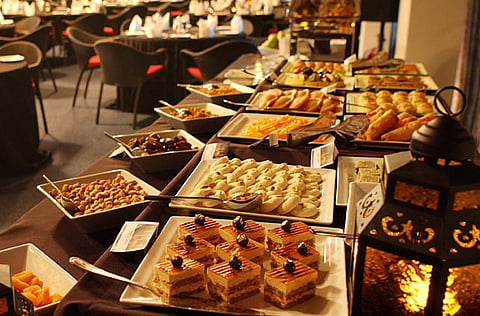Not-so-fresh food at iftar can harm health
Health experts urge people not to consume fruits that are kept out for long hours

Dubai: After a long day of fasting, few may query whether the foods they are eating as they end their fast during Iftar are safe to consume.
But without proper hygiene and proper chilling, some foods can actual do a body real harm, say experts.
Consuming cut fruits and salads that have been exposed to high temperature variations or have not been cleaned properly, could actually be hazardous given hidden high bacteria counts lurking in the food, especially given that the UAE is experiencing one of the hottest summers in nine years.
Nutrition experts also warn that and people consuming them should also be careful that they have the right combination of foods in order to digest them properly, say health experts.
Due to rapid oxidation, you should not wait for longer to eat your fruits after they are cut.
“It is good to include fruits and salads in your meal due to the high nutritive value but people should make sure that they have these in right combinations as consuming different kinds of foods at the same time could hamper with digestion. For instance, I recommend that after you break the fast with dates and water, and want to have, say, orange juice, you should leave a gap of at least 10 minutes. Having fruits with carbohydrates would not do good to your digestion,” said Jane A Darakjian, Nutritionist.
“You can cut and refrigerate them for half and hour to one hour at home. If you are mixing them and making salads, try doing it just before you are about to consume,” said Darakjian.
Any food prepared or cut and kept at room temperature in this hot weather is not fit for consumption, she added, noting that she usually recommends separating fruits, particularly the tropical ones like strawberries, kiwi, orange, from carbohydrates. Most salads, she added, can be taken along with the regular meal.
Fruits and vegetables need to be washed properly under running water to remove dust and contamination.
“Particularly in restaurants, the fruits and vegetables are cut and kept for long hours. As a result they may not give much of a health benefit,” said another nutritionist.Another aspect that one needs to be careful about is the time between cutting and consuming the fruits and vegetables.
Dubai Municipality advises people to consume sliced fruits immediately due to the rapid oxidation which reduces nutritive value of the fruits.
Regarding storage, the municipality advises that leafy vegetables are stored in the bottom of the refrigerator and separated form raw foods such a meat, fish or poultry. Fruits and vegetables should be stored in clean cool and dry place and away from moisture.
Sign up for the Daily Briefing
Get the latest news and updates straight to your inbox



